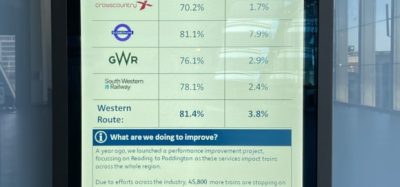RIA publish data and digital priorities report
Posted: 29 March 2023 | Elliot Robinson (Editorial Assistant - Global Railway Review) | No comments yet
The Railway Industry Association has published a new report covering the challenges and opportunities that data and digital technologies offer the rail industry.


The Railway Industry Association (RIA) has launched a report outlining the challenges and opportunities facing the rail industry on data and digital technologies. The report, entitled ‘Data and Digital Technologies in Rail: Industry needs, opportunities, and priorities’, comes after the UK Government published its Transport Data Strategy, which minsters say will improve passenger access to digital apps and sites to help plan, pay and access the transport system.
Following a consultation of RIA members, the report includes six key ‘asks’ of Government, policy makers and clients, which would enable, expediate and ensure the success of the UK railway’s digital transition over the next 10 years: the ‘Digital Decade’. These six ‘asks’ are:
- The railway’s digital transition requires leadership, strategy, and action, starting now. Strong cross-industry leadership is needed, to define a strategy and to ensure solid commitment is made to bring about the required changes and investment
- Rail talent needs to be empowered through upskilling and creating the right culture. Railways need a cross-industry drive to ensure people working in rail have the right skills for the new digital world, and they need to be empowered through widespread cultural and organisational change to reap the full rewards
- Every organisation should place customers at the heart of everything it does and remain receptive to change. Collaboratively, across the client-supplier interface, rail’s offering needs to be constantly developed to ensure it reflects an ever-changing world
- Invest in Innovation. Invest In Implementation. The industry needs to open itself up to different ideas from new and experienced innovators in its own and other industries. This will require investment in innovation, implementation, and the business changes that go with it
- Operations and maintenance must embrace the digital future, building in digital approaches from the ground up and designing assets, operations, and maintenance around them
- Collaboration and openness are vital, and this starts with clients. The sharing of robust datasets through appropriate channels should be built into procurement and service contracts to ensure compliance across the supply chain.
Related content you will enjoy:
RIA Scotland welcomes the publication of rail funding for CP7 (April 2024 to March 2029)
“Just after the UK Government published its Transport Data Strategy, we are delighted to publish our new report, which sets out the challenges and opportunities facing the rail industry on data and digital technologies,” Milda Manomaityte, Innovation Director for RIA, said. “As this new report shows, effectively harnessing the power of data is crucial to building a railway fit for the future. From smart sensors to the use of cutting-edge AI, data will play a critical role in a fully integrated railway in the years ahead.
“Railway industry leaders and policy makers need to ensure everyone working in UK rail is ready for the transition to an increasingly data-led network over the next 10 years, in what will be a Digital sector. Following an extensive consultation with a broad range of RIA members, the six recommendations contained in this ‘data and digital priorities’ report set out the tools the industry needs to effectively embrace data now and in the future. From strong leadership to effective collaboration, we urge the Government, policy makers and rail clients to adopt these recommendations.”








